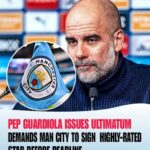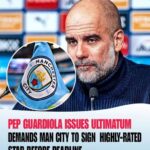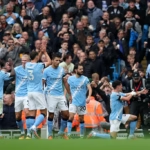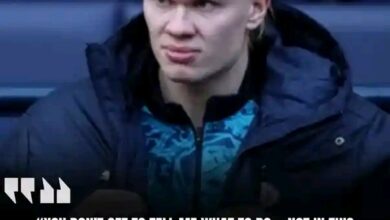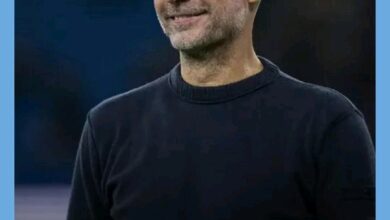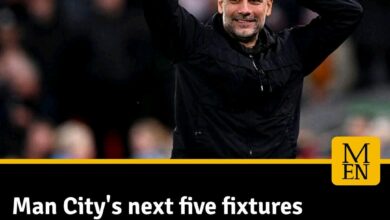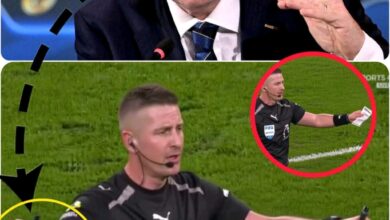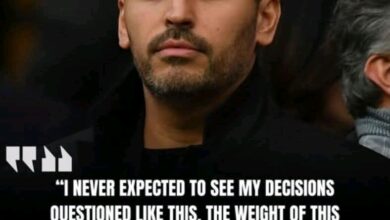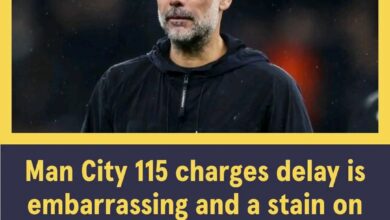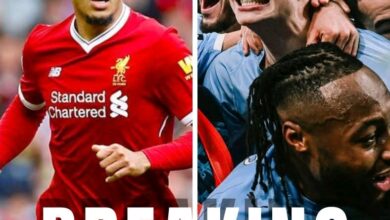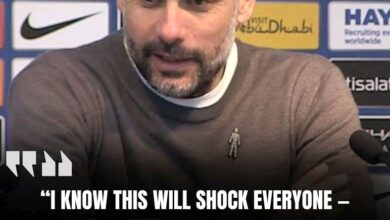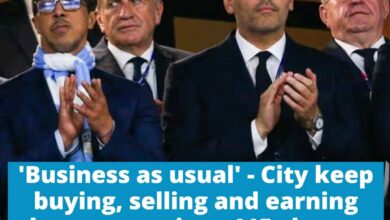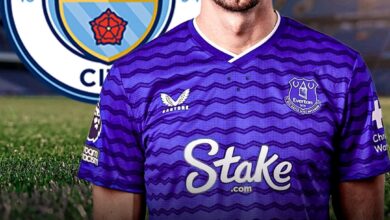Forget Haaland and Doku: 8/10 Man City Star Was the Real Hero vs Liverpool

Manchester City’s 3-0 demolition of Liverpool on November 9, 2025, will be remembered for many moments—the brilliance of Haaland, the sensational strike from Jeremy Doku, and the controversy of Liverpool’s disallowed goal—but for those who watched closely, one player stood head and shoulders above the rest: Nico Gonzalez. The Spanish midfielder, often overlooked in conversations dominated by City’s attacking stars, was the true hero of the Etihad on that day, delivering a performance that silenced doubters and reshaped perceptions of his role at Manchester City.
Since his arrival from FC Porto in January for £50 million, Gonzalez’s City career had been marked by patience, adjustment, and a gradual climb up the pecking order. Initially, questions surrounded his game time and his ability to integrate into Pep Guardiola’s well-drilled system. He had made just 61 minutes in the FIFA Club World Cup earlier this year, and speculation in the summer suggested he might seek a move elsewhere. Critics argued that, while talented, he lacked the immediate impact needed to secure a starting spot in a team brimming with world-class talent. Yet, in front of 50,000 fans at the Etihad, Gonzalez made it clear that he had arrived not to simply fill a bench, but to stake his claim as one of the most important midfielders in Guardiola’s squad.
The match itself began with Liverpool attempting to assert themselves, pressing high and moving the ball quickly through Salah and Núñez. For the first ten minutes, there were signs that the Reds might challenge the Cityzens’ dominance. However, it was City who had the first major opportunity, with Erling Haaland denied from the penalty spot by Liverpool’s stand-in goalkeeper Giorgi Mamardashvili. The save was crucial, a statement of intent from the Georgian shot-stopper, and it briefly gave Liverpool hope. But football, as ever, is a game of fine margins, and Haaland would soon show why he is regarded as one of the most lethal strikers in world football, opening the scoring in the 29th minute.
City’s early dominance was subtle but calculated. Guardiola’s men controlled possession, moved with precision, and positioned themselves to exploit Liverpool’s weaknesses. In this structure, Nico Gonzalez thrived. Unlike the more attacking roles of Haaland or Doku, Nico’s work was largely invisible to the casual viewer—but to those paying attention, his influence was immense. He dictated tempo, read Liverpool’s pressing patterns, and provided a reliable passing outlet in central midfield, covering for the absences of Rodri and Mateo Kovacic.
Gonzalez’s defining moment came just before halftime, in the 45+3rd minute. Bernardo Silva, ever the creative orchestrator, slipped a pass to the Spaniard outside the box. Nico, with impeccable timing and composure, struck the ball low and hard into the bottom corner past Mamardashvili. The goal was a masterclass in precision, timing, and confidence. Van Dijk, normally untouchable, could only watch as the ball nestled into the net, a look of stunned disbelief on his face. The goal doubled City’s lead and effectively shifted the psychological balance of the game. While Haaland’s goal had given City the lead, it was Gonzalez’s strike that demonstrated control, authority, and the growing importance of this young midfielder in Guardiola’s system.
But Nico’s contribution was far more than just a goal. Across the 90 minutes, he displayed a complete midfield performance. He won all three of his tackles, dominated five of six ground duels, and completed 51 passes with 88% accuracy, four of which pierced Liverpool’s defensive lines into dangerous positions. He also recovered two balls, intercepted twice, and maintained positional discipline, showing why Guardiola’s approach of patient integration for young players was paying dividends. While Doku and Haaland drew headlines for their attacking prowess, it was Gonzalez’s all-round excellence that allowed City to dominate without being stretched, to maintain balance in the midfield, and to suppress Liverpool’s fleeting bursts of momentum.
The performance did more than just influence the game; it challenged assumptions. Over the summer, many had wondered if Nico would leave Manchester City due to limited opportunities. Guardiola, however, remained steadfast in his belief that the Spaniard would develop into a key figure. When asked about Nico earlier in the season, Guardiola had said: “I’m pretty sure he will get it, he’s come for many years. And physicality, and he wants to learn, he learns quickly. So it’s going to happen.” On that night against Liverpool, Guardiola’s patience was vindicated. Nico’s growth, intelligence, and adaptability were evident, demonstrating that a measured approach to nurturing talent can produce extraordinary results
Fans were quick to notice. On social media, City supporters celebrated Gonzalez as the standout performer. “Nico Gonzalez has changed our lives. I haven’t heard City fans mention Rodri in weeks now,” one wrote. Another simply stated, “Nico Gonzalez is something special,” while others highlighted his ability to step up in the absence of Rodri and Kovacic: “Nico Gonzalez master class in midfield today. Needed it with Rodri and Kovacic out.” The accolades reflected the collective admiration for a player who had quietly but decisively taken on the responsibility of controlling the game, dictating tempo, and contributing to the scoreline.
Indeed, Nico’s role in Guardiola’s team is not merely functional—it is pivotal. With Rodri still recovering from an ACL injury, the Spaniard effectively serves as the ‘mini Rodri,’ a player capable of providing both defensive solidity and forward momentum. His understanding of positional play, awareness of passing lanes, and ability to read the opposition are crucial in a team that thrives on meticulous structure and tactical discipline. The mentorship provided by Rodri, who has reached the pinnacle of midfield excellence over the past five years, has clearly influenced Nico’s development. As Nico himself noted in a recent interview: “He gives me advice…the last game at halftime he gave me some advice because he knows a lot what to do in that position.” Learning from a player of Rodri’s caliber ensures that Nico not only fits into the team but is prepared to excel at the highest level.
The broader context of the Premier League title race adds further significance to Nico’s performance. Manchester City are chasing Arsenal at the top of the table, and consistency is key. A commanding victory over Liverpool, one of their fiercest rivals, sends a message—not just to the opponents, but to the league at large. It shows that City possess not only the stars capable of moments of brilliance but also the depth to maintain dominance across all positions. Nico Gonzalez’s display exemplified this depth: a young player, previously doubted, stepping up when the team needed him most, demonstrating that Guardiola’s system is about more than individual names—it’s about collective intelligence and the integration of talent.
From a tactical standpoint, Gonzalez’s performance highlighted several key aspects of modern football. First, the importance of adaptability: Nico was required to cover spaces usually occupied by Rodri, adjust to Liverpool’s pressing, and maintain defensive balance while also contributing offensively. Second, decision-making under pressure: his passes, tackles, and positioning reflected intelligence and awareness beyond his years. Third, leadership by example: while he may not captain the team, his work ethic, commitment, and execution inspired teammates and reassured the coaching staff that Guardiola’s trust in him was justified.
Liverpool, on the other hand, had little answer to City’s midfield dominance. Arne Slot’s men were outmaneuvered, their pressing neutralized, and their attempts to build from the back consistently disrupted. While Mohamed Salah and Darwin Núñez tried to spark attacks, they were isolated and often forced into defensive positions. The disallowed goal by Van Dijk, ruled out due to Robertson’s offside positioning, compounded their frustration, and by the time Doku struck in the second half, the game was effectively over. Critics focused on individual errors, such as those by Ibrahima Konaté, but the story of the match was about City’s control and the influence of players like Nico Gonzalez, whose presence dictated the rhythm and flow.
Media reactions reflected the consensus. Analysts praised Nico’s maturity, tactical intelligence, and ability to perform in a high-pressure environment. Former players highlighted the importance of integrating young talent carefully, citing Gonzalez as a model of how patience and guidance can transform a promising player into a crucial first-team asset. Meanwhile, City fans celebrated the emergence of a midfielder capable of stepping into the shoes of a legend, bridging the gap between Rodri’s absence and the team’s ongoing quest for domestic and European glory.
The 3-0 win also reaffirmed Guardiola’s reputation as a master tactician and mentor. While attacking talents like Haaland and Doku provided the spectacle, it was the silent work of Gonzalez that allowed the team to execute the game plan flawlessly. Guardiola’s approach—careful observation, incremental integration, and trust in young talent—was vindicated, showing that success at the highest level often relies on details invisible to the casual observer.
Looking ahead, Nico Gonzalez’s development is now central to City’s midfield strategy. Rodri’s eventual return will create competition, but this is a positive challenge, one that pushes both players to maintain high standards. The synergy between them, with Rodri offering mentorship and Nico providing youthful energy and tactical discipline, strengthens City’s squad depth and prepares the team for the grueling demands of a Premier League title race and Champions League campaign.
In conclusion, while Erling Haaland and Jeremy Doku grabbed the headlines in Manchester City’s victory over Liverpool, the true hero was Nico Gonzalez. His first goal of the season, combined with a complete midfield performance—tackles, duels, interceptions, passes, and positional intelligence—showed a player maturing into one of Guardiola’s most vital assets. Doubters were silenced, and City fans witnessed the rise of a midfielder capable of controlling games, filling the void left by Rodri, and cementing his place in one of the world’s most demanding squads.
As the season progresses, Nico Gonzalez will be remembered not just as a goal scorer or a promising talent, but as the player who, on that November night at the Etihad, demonstrated that patience, trust, and meticulous coaching can turn potential into performance, and a young recruit into a real hero. The message is clear: Guardiola’s vision works, Nico is ready, and Manchester City are stronger than ever, with midfield intelligence and talent that may yet decide the destiny of the Premier League

